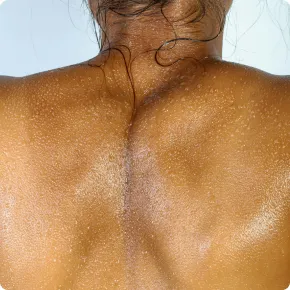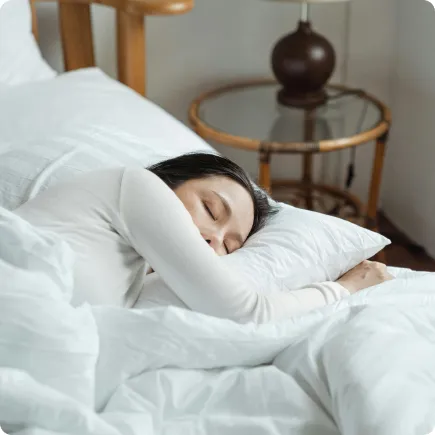
Menopause and Hot Flashes

What causes hot flashes during and after menopause?
Hot flashes are caused by the fluctuation and decline of your hormones, mainly estrogen. There are certain factors that are thought to make them worse, like stress, smoking, and being overweight. Some women find hot flashes can be triggered by caffeine, alcohol, spicy foods, processed foods, food sensitivities, and warm weather.
What is going on inside your body?
Lower estrogen levels cause your hypothalamus (the part of your brain that modulates body temperature) to send signals to your blood vessels to dilate in order to release heat. During menopause, this reaction is set off randomly, making you feel like you just ran a four-minute mile.
of Members report symptom improvement within 3 months.
care at your fingertips.

What are some medical-provider-prescribed treatments for menopause-related hot flashes?
Estradiol: This is the most effective and safe treatment available. It is both natural and FDA-approved. It is scientifically proven to eliminate night sweats in up to 75% of women. Estradiol replenishes the exact form of estrogen that your ovaries are no longer producing.
Paroxetine: This FDA-approved SSRI (selective serotonin reuptake inhibitor), may be prescribed for women who aren’t candidates for estrogen or do not want to take estrogen. Paroxetine increases the level of serotonin within your brain.
Venlafaxine: An SNRI (serotonin-norepinephrine reuptake inhibitor) may be prescribed for women who aren’t candidates for estrogen therapy or do not want to take estrogen. Venlafaxine increases the levels of serotonin and norepinephrine levels in your brain.
Gabapentin: This is a seizure medication that can act as a mechanism to help control body temperature.
Clonidine: This is a high blood pressure medication that treats hot flashes by lowering blood pressure.
Veozah: This FDA-approved treatment is a nonhormonal way to treat moderate to severe hot flashes.
Femistry: A nonhormonal supplement is clinically proven to relieve menopause symptoms like hot flashes naturally.
of Members report symptom improvement within 3 months.
care at your fingertips.

What are some non-medical treatments for menopause-related hot flashes you can do at home?
Cool sleep environment: Set your bedroom temperature between 60 and 68º F, invest in a cooling mattress or pillow, use sheets with breathable material (like cotton or linen), run a bedside fan, and keep a glass of cold water on your nightstand.
Nutrition: Phytoestrogen foods (such as yams, flax, and lentils) can mimic estrogen within your body—these foods can elevate your estrogen levels and support you against night sweets.
Supplements: Black cohosh, vitamin E, and dong quai can help reduce night sweats. However, medical studies are inconclusive. Occasionally, vitamins B6 and 12 can help with anxiety related to night sweats.
Breathing exercises: Deep breathing exercises and mindful meditation can assist in calming anxiety and reducing heart rate and blood flow.
Daily exercise: Consistent physical exercise can help your body regulate temperature and release heat.
Layering clothing: Wearing loose clothing and layers (think a t-shirt and light sweater versus a cable knit sweater) allows you to control your temperature by removing items to cool off.
Cannabis: While very little evidence suggests that cannabidiol (CBD) can treat symptoms, some women find relief from using this recreational drug at home.
What should you do next?
Let’s get you prepared to be paired with your provider!
Select and submit all of the symptoms you are currently experiencing so your doctor can assess and provide a tailored treatment plan for you.
of Members report symptom improvement within 3 months.
care at your fingertips.

References
- A recent analysis of the Study of Women’s Health Across the Nation (SWAN) found that hot flash symptoms typically last between 5 and 13 years and were rated moderate-to-severe by most women.



